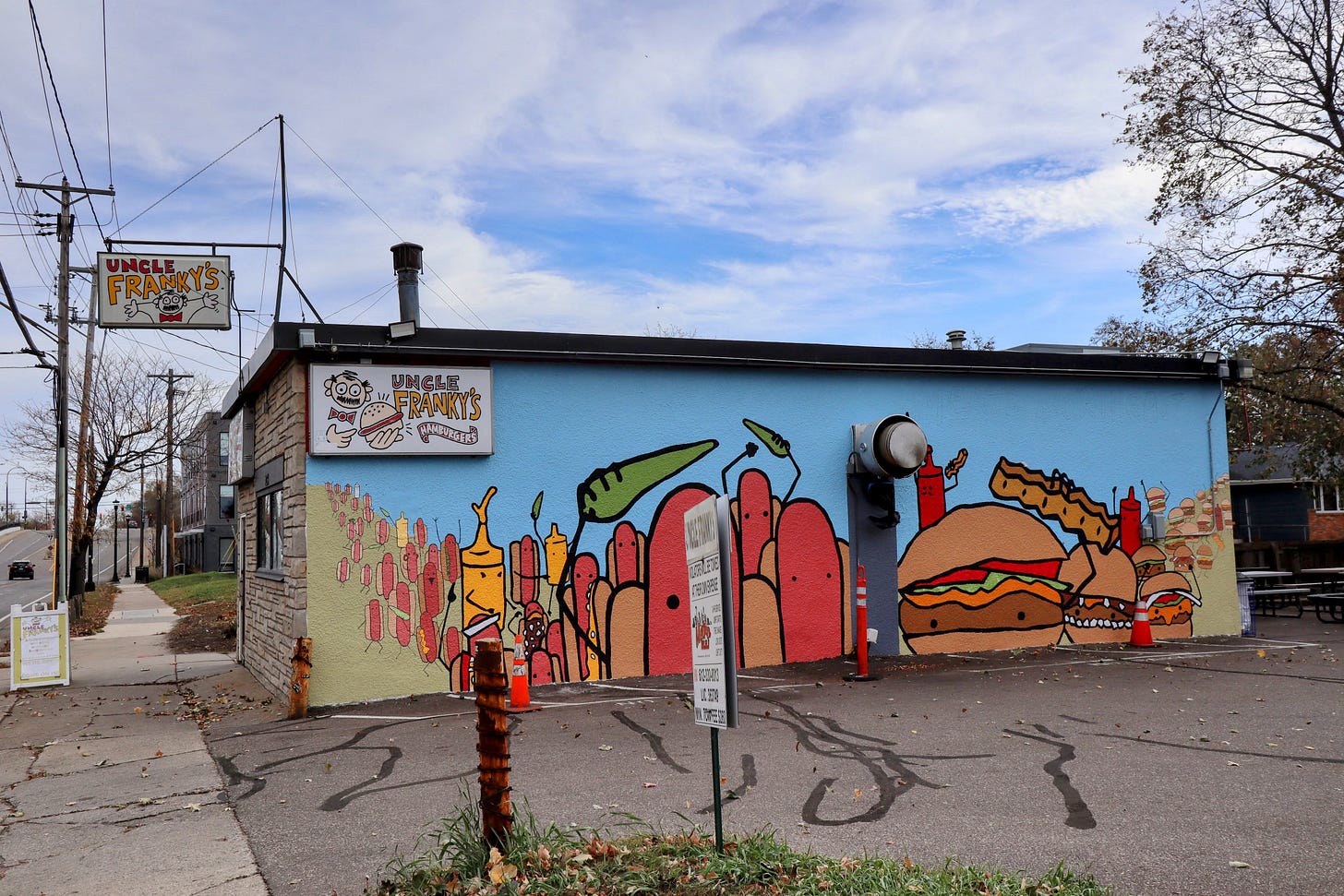Thanksgiving!
I can almost smell the turkey! And the stuffing. And gravy.
I love it!
But, honestly, I hate the clean-up afterward, so the Sweeney family is having sushi instead.
That’s right.
A big platter of sushi.
This year, I’m opting out of the eight hours of dishes that come after two hours of eating. And because today is the day before Thanksgiving, and I’m currently NOT dry-rubbing a twenty-pound bird, we have time to talk about Letters of Intent (LOI).
I’ll get into more details below, but a LOI is simply a short document that spells out the basic terms and timeline for how you will develop the property and what needs to happen for that development to be viable. Your goal is to come to an agreement with the seller on the basic terms. The LOI comes before the Purchase Agreement. So much of being a developer is knowing what happens when. Doing things out of order is a very, VERY quick way to lose a lot of money.
Okay, so last week, we settled on a site for our development: Uncle Franky’s.
Now, to be clear, settling on a site and declaring your intention to build is a lot like pointing to a beautiful man or woman on the street and declaring that one day you’ll be married, have 2.5 kids, and a four-bed, two-bath on Cape Cod.
Possible.
But you better bring your A-game.
And by A-game, I mean a clear plan, careful listening, excellent communication, and a detailed Letter of Intent.
Once we’ve found our potential site, the first step is to get in touch with the owner. At this point, we’ve already looked up the site with the county to verify ownership. We can run a skip trace and get the owner’s phone number, but candidly, I like to shake someone’s hand and get a feel for who they are. If I can’t find their phone number, I’ll get in my car and drive over. If there’s a restaurant on the site, I’m having lunch. If it’s a coffee shop, I’m having coffee. You’d be surprised how often the person behind the counter or register owns the 10,000 sq ft. piece of land you want to build on. Sitting down with the seller gives you a chance to identify…
1) …what they might want out of a deal and
2) what this land/site/building means to them.
And to understand that first point, you often have to understand the second, first. Fledgling developers frequently stumble at this initial stage in the conversation because they emphasize what THEY want from the seller (the land) but not what the seller needs. And often, what the seller needs is for you to understand what the property means to them in the context of the wider neighborhood. Remember that I specialize in urban infill. I want to find parcels of land that are just big enough to carve out space for design-forward apartment homes for new tenants. And, I’m not knocking down shopping malls to do that. I’m developing a gas station and a corner store. Three neighboring houses. Maybe a vacant lot overgrown with weeds.
Which is to say that those sites likely mean something to someone else quite separate from my developer dreams.
Quick Story:
A few years ago, a friend of mine went back and forth with a seller for months, long hours of sipping coffee at the back of the seller’s corner store. The seller was nearing retirement age, and his dog was even older. It was a little dachshund-beagle mix, and to hear my friend tell it, when the dog wasn’t growling or giving him the side eye, he was, much to the older man’s amusement, peeing at my buddy’s feet. My buddy, trying to be helpful, would grab a mop from the storeroom while the man took the dog out to pee (too late!) in the lot next door. The conversation/negotiations would often continue there in the vacant lot (also owned by the man).
"Sean, I was going crazy!” my buddy told me. “Meeting after meeting. We had all the details hammered out, but I couldn’t get him to sign the LOI. Finally, I returned to the store one day while the guy was throwing a ball for the dog, and his son was behind the counter. The son tells me how much his dad loves that dog. How much time he spends out there in the vacant lot throwing balls for the dog.”
And then it dawned on my friend.
He went back outside and proposed a small dog park running adjacent to the building he wanted to build. He had enough space. He could do it.
The seller signed the Letter of Intent that night.
You see, the man wanted to sell. But he still wanted to be part of the neighborhood. And he wanted a place to throw the ball with his dog. It was that simple.
Can you build a dog park to satisfy every seller? Heck no. But you have to pay attention.
Your other goal in these conversations, as you hammer out the details of your LOI is simply to see if the seller will be a good partner. And by good, I mean patient and reasonable.
And here’s why:
When I write a non-binding LOI, I enumerate my intentions with their property and lay out all of the contingencies that will eventually be included in a binding purchase agreement. What I’m crystal clear about is what I’m hoping to do: put their site, eventually, under a purchase agreement, and then do due diligence and prepare my building plans. But that means I typically need 12 months of due diligence because I don’t want to be the owner of, say, Uncle Frankie’s and the land next door until I’m ready to start a construction project. It doesn’t do me any good to carry the costs of owning that land until I can build. (Getting this much time can be difficult in larger markets like New York and San Francisco. But it’s always the goal). And, as issues arise during due diligence, I need to be able to go back to the seller and have calm and rational conversations about potential obstacles to our deal. You have to have sellers who are good partners. You’re not simply writing a check. And the seller isn’t riding off into the sunset on his horse, with your check, and his incontinent dog.
The LOI is typically a three or four-page document that includes price, earnest money, due diligence time, closing time, and any contingencies. I always try to keep earnest money low on development deals since every dollar I spend on earnest money is less money I have to work on my plan and get the project approved.
So, the major terms of the LOI are:
Price
Earnest money
Due diligence time
Closing date
I always tell them we will do a physical investigation, a regulatory investigation, an environmental investigation
We will check the title
And we’ll do a survey
The contingencies include:
There is a clean title and they legally own the land (and can sell!)
The survey is clean
The environmental reports are clean
City approval to build my project
Construction Financing
If the above contingencies become an issue during due diligence, I can back out of the eventual purchase agreement. That’s never the goal, but you have to have the out. If the seller agrees to these terms and signs the LOI, then, and only then, do we call in a lawyer (and spend money on that lawyer!) to put together the purchase agreement.
LOI’s are definitely more art than science, but they are built on good listening, good partners, and a timeline long enough that you can do all of your due diligence before you actually own the land. Some people think six-story apartment buildings are built on a solid foundation of concrete and steel. But YOU know that really what holds them steady is a resilient LOI. Do it right the first time, and you increase your chances exponentially of a successful build.
Peace.
PS. Can someone PLEASE try this and let me know how it turns out?!








Hi Sean,
First off, thank you! Your writing is enlightening and generous.
I've been outright rejected or quoted exorbitant "FU" prices for several vacant lots and teardowns. Granted, I'm in Brooklyn, where "FU" is practically a morning greeting.
Do you have any advice on how to overcome initial rejection and start a conversation?
For instance, if the landowner doesn't own the corner restaurant, and you call them only to receive a flat 'no' and a side of 'go screw yourself,' what would you do?
Thanks again! -Andrew
What are the most time consuming steps of that 12 months of DD? Do you kick everything off at the same time, or is it a bit more sequenced than that? If the latter, I'd love to hear a general order of operations for how you approach it.